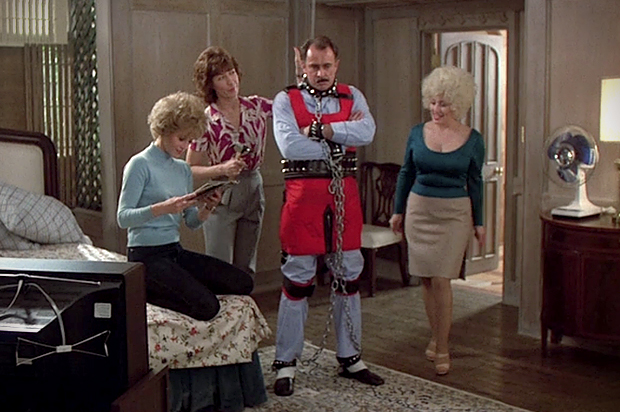From the time that we enter school we are encouraged
to pursue our dreams and instilled with the belief that if we with hard work we
will grow up to do what we love. Unfortunately, for all too many of us, life in
the working world is not the vision of opportunity that we imagined and is
instead a matter of putting in our time and taking home a paycheck. While it is
disheartening to work in a job that we find mundane or lacking in opportunity
these very real drawbacks can be countered by a healthy working environment. In too many workplaces, however, the working environment is one plagued by office politics that can make an eight hour day feel like eighteen hours or more. For readers who know all too well just how toxic a work environment can become,
however, there is a film that can provide just the escapism, empowerment, and
inspiration that you need; the 1980 black comedy Nine
To Five.
 |
| These secretaries are total bosses |
The story begins with timid secretary Judy (Jane
Fonda) beginning a new job at Consolidated Companies. Almost as soon as she
begins training Judy is exposed to the corruption and incompetence that
dominate the office as she witnesses the ways in which her co-workers’are
gossiped about and harassed on a regular basis. Eventually, she finds allies in
no-nonsense office manager Violet (Lily Tomlin) and misunderstood secretary
Doralee (Dolly Parton), who have both reached their breaking points. After their boss, Frank Hart (Dabney Coleman) discriminates against Violet, sexually harrasses Doralee, and fires one of Judy’s friends all in the same day, the
trio meet at the local watering hole to vent their frustrations. While they form a true friendship over drinks and mutual grievances, the next morning the women return to work as miserable as
ever...until they realize that Violet has accidentally flavored Mr. Hart's coffee with rat poisoning. After a series of misunderstandings, mishaps, and madcaps hijinks they manage to take Mr. Hart captive and institute a series of progressive reforms
that increase both productivity and office morale. Just as the office begins to
become a truly healthy working environment however, the trio finds their plan in danger
of becoming exposed.
Despite the film’s constant laughs, its subject
matter was and remains a serious indictment of the modern working world.
Throughout the film talent, ambition, and dedication are liabilities at the
fictional Consolidated Companies while incompetence, underhandedness, and
sycophancy are rewarded as company assets. Similarly, employees of real companies
in every industry continue to face adversity despite their best efforts, while
colleagues who may not work as hard or possess as much ingenuity are able to
advance due to their ability to maneuver office politics. Although sexual
harassment and office bullying are areas in which ample progress has been made,
they continue to remain issues that arise all too often in the workplace, even
thirty-six years after the film’s release. Similarly, while offices have begun
to institute the reforms championed in the film, all too many workers are
routinely forced to endure demoralizing conditions and toxic work environments.
Despite the film’s comedic tone it remains a rallying cry for a workplace that
is worth more than a paycheck.
 |
| Now about that promotion... |
The film’s talented cast ensures that the story strikes just the right balance between zany laughs and scathing social commentary. Jane Fonda is nearly unrecognizable as the naïve and meek Judy, and expertly portrays her character’s evolution to empowered employee. Lily Tomlin is a force of nature in her role as blunt and world weary Violet and captures the toll that years of pent-up frustration have taken upon her character. Dolly Parton is an endearing combination of effervescent charm and streetwise grit in her role as unfairly maligned office bombshell Doralee, and lends her talent to the film’s hit title song. Dabney Coleman is a villain viewers will love to hate as “sexist, lying, hypocritical, bigot” Frank Hart in a turn that is equal parts dark and comic.
While numerous changes have been made to the modern
workplace since its 1980 release, Nine to
Five remains an apt examination of working life at its worst. Through its
biting script and expert comedic performances, the film reminds us of the advances
that have been made in the workforce and sheds much needed light on the many
ways in which the modern workplace continues to remain sorely lacking. With a
combination of brilliant comedic performances, biting barbs, and scathing
social commentary Nine to Five has
earned its place in film history as well as within the hearts of many a working
man and woman.
 |
| Who's harrassing who?! |

Thank God for Dolly Parton :)
ReplyDeleteAmen and thank God she didn't let Porter Wagoner hold her down!
ReplyDelete